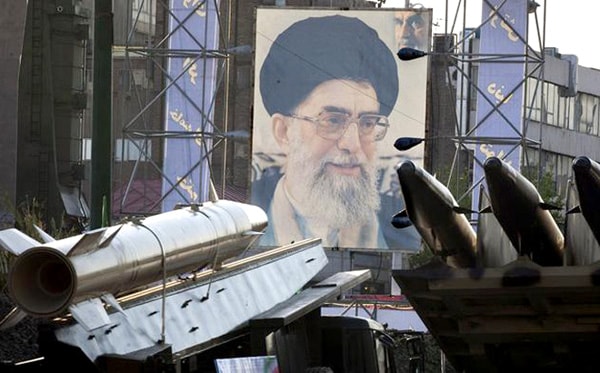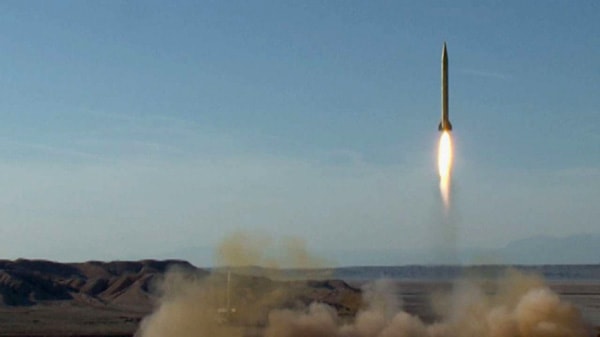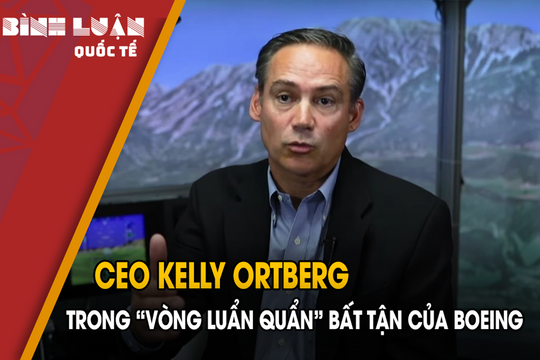Iran nuclear dossier, vicious circle
(Baonghean) - US-Iran relations under President Donald Trump are predicted to be turbulent and uncertain. The "tests" between the two sides that have been continuously brought up in recent times show that the more tough the new US administration is, the more challenging Iran is, and the vicious cycle over Iran's nuclear dossier may return.
“Tit for tat”
The Iranian nuclear issue seemed to have settled down after the historic agreement between Iran and the P5+1 powers (including the US, Russia, the UK, France, China and Germany) in July 2015. However, after US President Donald Trump was elected, the US-Iran relationship became “tense as a bowstring”.
The defiant statement by the Iranian parliament speaker that “it will restart the nuclear program” is not too surprising after the “tit-for-tat” attacks from both sides in less than a month. During the election campaign, Mr. Trump criticized the nuclear agreement with Iran as “the worst deal ever negotiated.”
 |
| Iran threatens to restore nuclear program. Photo AP |
Once in the White House, the 45th President of the United States quickly showed that the US would take a tougher and more confrontational stance towards Iran, which he called "the world's leading terrorist country", in an interview with Fox News.
For its part, earlier this month, Tehran test-fired a new ballistic missile. Immediately, the Trump administration imposed sanctions on 13 individuals and 12 organizations related to Tehran’s missile program.
In response, Iran’s Islamic Revolutionary Guard Corps announced military exercises in Semnan province to demonstrate its military might and “reject US sanctions.” Iran also announced that it would impose legal sanctions on US individuals and entities that Tehran said were secretly supporting “regional terrorist groups.”
Many believe that Iran chose the timing of its missile test in late January to see how the new US administration would respond. And the recent tit-for-tat attacks between the two sides are also a message from Iran that they are ready to return to the “starting point”.
In fact, Iranian President Hassan Rouhani recently ordered Iran’s atomic agency to design and operate a nuclear propulsion system for ships, a message that Iran is ready to respond to any violation of the nuclear deal reached two years ago.
US diplomatic challenges
On the US side, President Donald Trump once wrote on Twitter: “Iran is playing with fire”, along with the warning that “the US does not rule out military options in response to Iran’s launch of a medium-range ballistic missile”. These comments can be seen as a signal of the US’s new policy direction towards the Islamic Republic.
However, observers say that if he is not careful, Mr. Trump risks being pushed into an awkward situation, having to react strongly to all of Iran's missile tests and will continue to "make enemies" with a leading influential factor in the Middle East region.
In fact, the new administration in Washington is in dire need of Iran’s cooperation in the fight against the self-proclaimed Islamic State (IS) in both Syria and Iraq, a war that Mr. Trump has asserted is a top foreign policy priority. Creating conflicts with Iran means the US is creating a situation of “more enemies and fewer friends” before this war comes to an end.
 |
| Iran launched a medium-range ballistic missile in late January 2017. Photo: Reuters. |
Given such a reality, the scenario of the US canceling or unilaterally terminating the nuclear deal with Iran is unlikely to happen, because this would not only harm US interests but could even lead to an international crisis.
But the Trump administration certainly won’t let the Iran nuclear deal fall apart easily. There are two possible scenarios. First, the US could “force” Iran to violate the deal, opening the way for additional sanctions on the country. But this seems to pose more risks to the US if Washington is accused of violating the deal.
Second, the US will continue to maintain the signed agreement but will monitor it more closely. This may be the most likely scenario given the widespread international support for the historic Iran nuclear deal. Many countries around the world, including US allies such as the European Union (EU), are happy and have begun to look for business opportunities with Iran after the sanctions are lifted.
So, despite the “frustration”, the Trump administration probably will not be able to reverse the support of countries on the Iran nuclear issue. But Washington may limit any benefits that Iran can receive from this agreement, for example, encouraging US banks to do business with Iran again as they did under President Obama. Of course, how to behave and deal with Iran will also be a big challenge in Trump’s foreign policy.
It is unclear what the US’s specific approach to Iran will be, but it is clear that the Iran nuclear deal, once considered a legacy under President Obama, is now quite fragile. If this nuclear dossier returns to its “starting point,” it will be difficult to avoid the risk of destabilizing the whole world.
Thanh Huyen
| RELATED NEWS |
|---|


